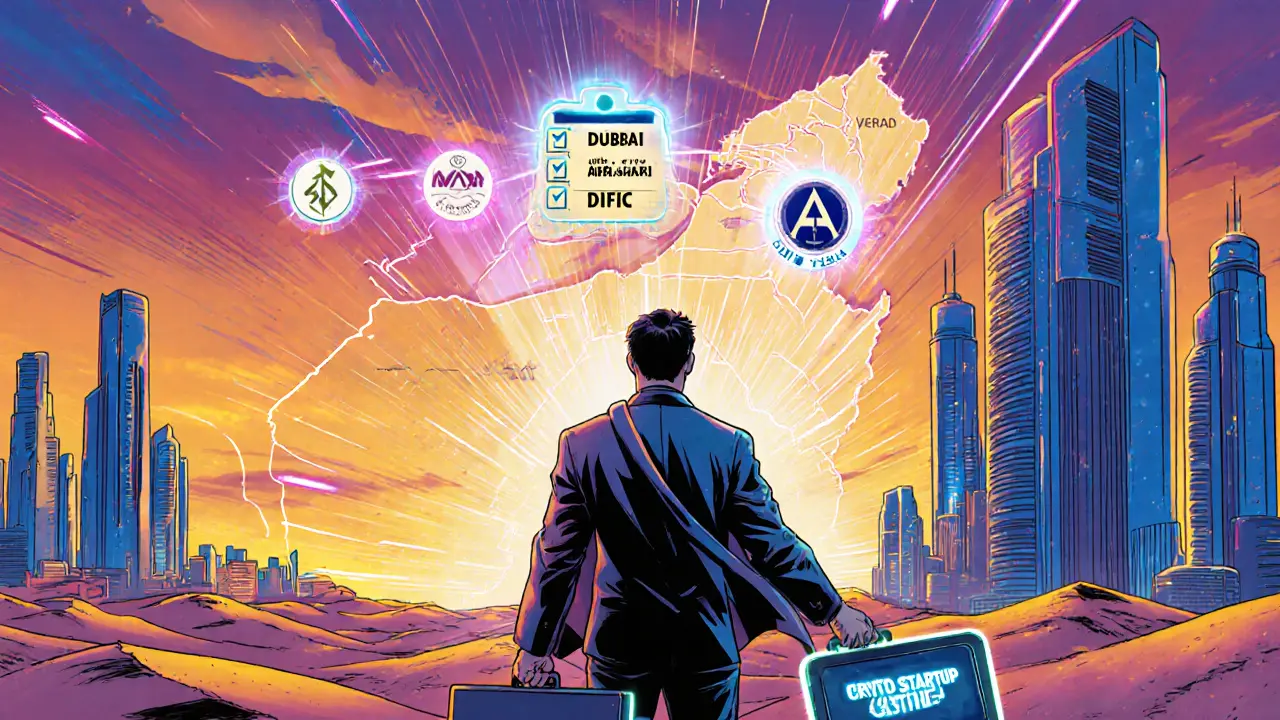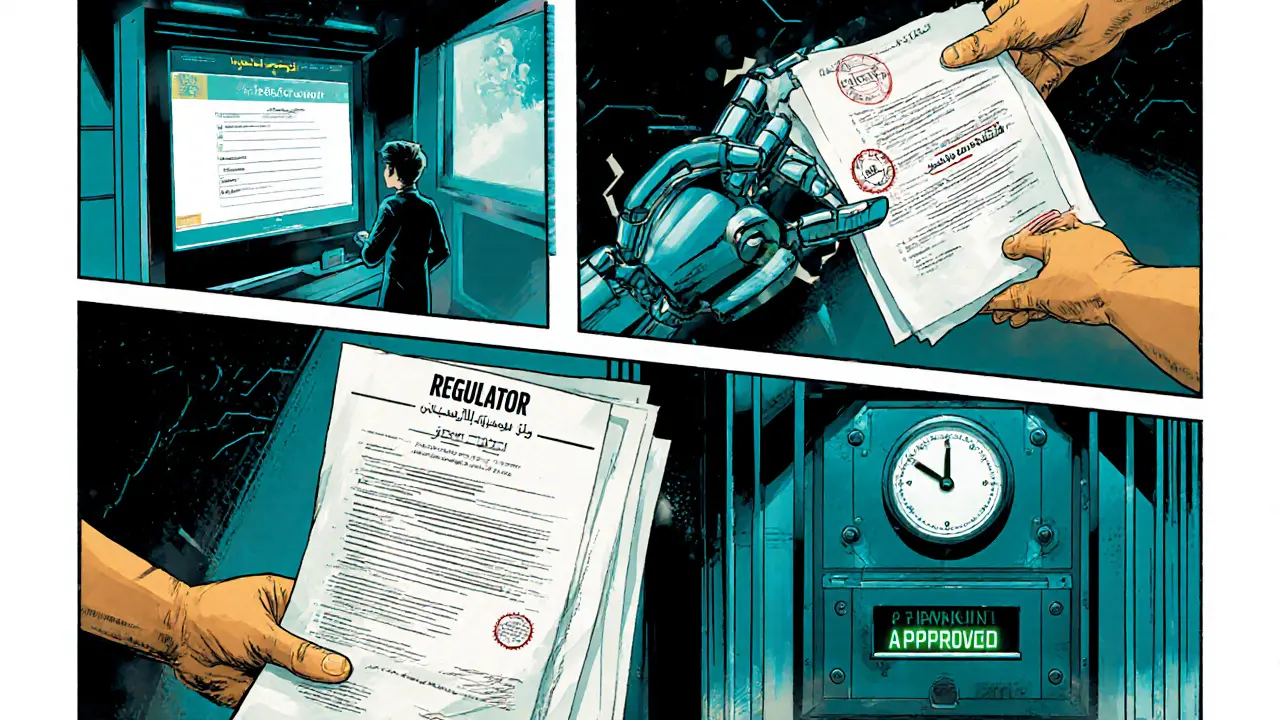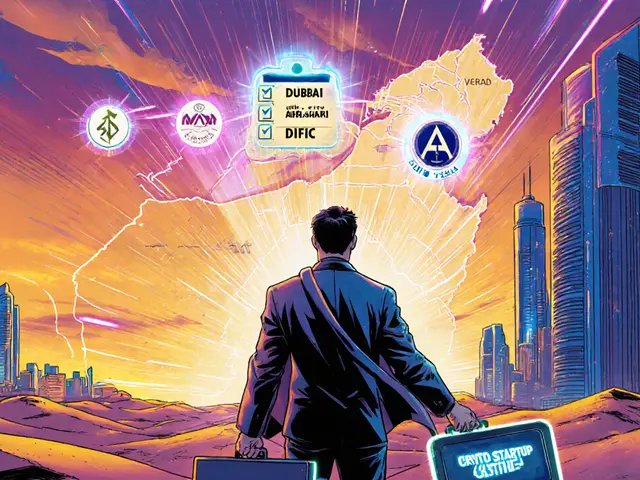- Home
- Cryptocurrency
- How to Set Up a Crypto Business in UAE Free Zones (2025 Guide)

How to Set Up a Crypto Business in UAE Free Zones (2025 Guide)
Crypto Business Setup Cost Calculator
Estimated Costs Summary
Click "Calculate Total Setup & Annual Costs" to see your estimate
Important Notes:
- Costs are estimates based on current regulations and may vary.
- Includes application fees, annual supervision fees, and insurance costs.
- Additional expenses like legal fees, compliance software, and bank setup are not included.
- Annual compliance costs range from AED 80,000 to AED 200,000 depending on licence scope.
- Always consult with a local advisor for precise figures.
UAE crypto free zone opportunities have exploded since 2020, yet many entrepreneurs still wonder how to navigate the maze of licences, capital requirements and compliance checks. This guide walks you through everything you need to launch a digital‑asset firm in the UAE’s most crypto‑friendly free zones, from picking the right regulator to filing the first paperwork.
Why the UAE is a top destination for crypto firms
The United Arab Emirates combines three powerful ingredients: clear federal crypto rules, specialised free‑zone regulators, and a business ecosystem that prizes speed. In 2022 the Cabinet adopted Resolution No.111, creating a unified framework for virtual assets across the country. Since then, four authorities have taken the lead:
- VARA - the Virtual Assets Regulatory Authority, housed in the Dubai World Trade Centre free zone, is the world’s first dedicated virtual‑asset regulator.
- ADGM - Abu Dhabi Global Market’s Financial Services Regulatory Authority, focused on institutional‑grade crypto services.
- DFSA - the Dubai Financial Services Authority, operating inside the Dubai International Financial Centre (DIFC) and covering a blend of traditional finance and digital assets.
- SCA - the Securities and Commodities Authority, overseeing crypto activities that fall outside the free‑zone ecosystem.
At the same time, the Central Bank of UAE is piloting a digital dirham, signalling that fiat‑to‑crypto bridges will become even smoother. For a crypto entrepreneur, this regulatory depth means you can pick a licence that matches your business size and growth plan.
Quick TL;DR - Key Takeaways
- VARA offers the most flexible, activity‑specific licences for startups (capital as low as AED100,000).
- ADGM suits institutional players; expect higher capital (up to AED1.5million) and stricter AML/KYC.
- DIFC bridges traditional finance and crypto, ideal for firms needing both banking and token services.
- Overall set‑up time: 4‑6weeks for VARA, 8‑12weeks for ADGM/DIFC.
- Annual compliance costs range from AED80,000 to AED200,000 depending on licence scope.
Understanding the Licensing Landscape
Each free zone follows a modular approach, meaning you apply for the exact activity you plan to run - exchange, custody, brokerage, token issuance, or wallet provision. The licence you choose dictates capital, insurance, and ongoing supervision fees.
VARA’s modular licences (2025)
VARA categorises activities into six buckets. Below is a snapshot of the most common licences:
| Activity | Paid‑up Capital (AED) | Application Fee | Annual Supervision Fee |
|---|---|---|---|
| Exchange Services | 500,000 | 70,000 | 150,000 |
| Custody & Wallet | 300,000 | 55,000 | 120,000 |
| Broker‑to‑Broker (Fiat‑to‑VA) | 250,000 | 50,000 | 100,000 |
| Token Issuance - Category1 | 1,000,000 | 90,000 | 200,000 |
| Token Issuance - Category2 (via distributor) | 100,000 | 40,000 | 80,000 |
Beyond capital, VARA demands a fit‑and‑proper test, a detailed business plan, and compliance policies that meet AML/CFT standards. Insurance coverage for custodial assets is mandatory, typically a professional indemnity policy of at least AED5million.
ADGM’s institutional licence
ADGM’s FSRA targets brokers, fund managers, and custodians that handle large‑scale institutional flows. Key points:
- Minimum paid‑up capital: AED1million for custodial services; AED1.5million for exchanges.
- Licences are comprehensive - you receive a single permit covering all approved activities, but you must demonstrate robust governance, audit trails, and a dedicated compliance officer.
- Annual surveillance fees start at AED200,000 and increase with transaction volume.
ADGM also requires external audit of your AML program by an approved UAE‑based firm, a step that can add 3‑4weeks to the approval timeline.
DIFC (DFSA) - The middle ground
The DFSA blends the traditional financial‑services framework with crypto‑specific rules. It issues licences for:
- Dealing in investments (including security tokens).
- Custodial services that link to regulated banks.
- Operating a trading platform that offers both fiat and crypto pairs.
Capital requirements start at AED500,000 for custodial services and AED800,000 for exchange platforms. The DFSA also mandates a local compliance officer and a sandbox‑testing phase if you’re introducing a novel token model.
Choosing the Right Free Zone for Your Business Model
Not every crypto firm needs the heavyweight infrastructure of ADGM. Here’s a quick decision matrix:
- Start‑up exchange or wallet provider? - VARA is the cheapest, fastest route.
- Institutional fund or large‑scale custodian? - ADGM offers the deep‑banking connections you’ll need.
- Security‑token offering that ties to traditional capital markets? - DFSA’s DIFC gives you access to established banking partners.
- Looking for tax‑free status and easy import/export? - Consider the Dubai Multi Commodities Centre (DMCC) free zone, which partners with VARA for crypto licences.
All free zones grant 100% foreign ownership, zero corporate tax for 50years (renewable), and full repatriation of profits. The main differentiator is the regulator’s focus and the capital you must lock up.

Step‑by‑Step: How to Register Your Crypto Company in a UAE Free Zone
- Define your activity. List every service (e.g., “custody of virtual assets” and “exchange of stablecoins”). This will decide which licence you apply for.
- Choose the free zone. Use the matrix above to pick VARA, ADGM, or DFSA.
- Reserve a trade name. Submit a name‑check through the free‑zone portal - the name must not contain “bank” or “insurance” unless you have specific approvals.
- Incorporate the entity. Most free zones require a limited‑liability company (LLC). Provide passport copies, proof of address, and a shareholders’ agreement.
- Prepare compliance documents. Draft AML policy, KYC procedures, risk‑assessment matrix, and a cyber‑security framework that meets ISO27001 standards.
- Submit the licence application. Upload the business plan, capital proof (bank statement or escrow), insurance certificates, and the fit‑and‑proper questionnaire.
- VARA: Use the e‑portal of Dubai World Trade Centre.
- ADGM: Submit through the ADGM Client Portal.
- DFSA: Use the DIFC licensing portal.
- Pay fees. Application fee (see table), plus a security deposit equal to 10% of the paid‑up capital.
- Await regulator review. VARA typically responds in 3‑4weeks; ADGM and DFSA may take 8‑12weeks due to deeper audits.
- Obtain the licence and open a corporate bank account. Most UAE banks now have dedicated crypto‑service desks; DMCC and Emirates NBD are popular choices.
- Launch operations. Implement the technology stack, conduct a sandbox test (if required), and publish your KYC/AML disclosures on the website.
Tip: Hire a local legal advisor early. The UAE’s AML/CFT checks are thorough, and a misplaced document can add months to the timeline.
Cost Breakdown - What to Budget For
Below is an approximate cost model for a VARA‑licensed crypto‑exchange with AED500,000 capital:
- Incorporation and trade‑name reservation: AED5,000‑10,000.
- Application fee: AED70,000.
- Annual supervision fee: AED150,000.
- Professional indemnity insurance: AED30,000‑50,000 per year.
- Compliance software (AML/KYC): USD15,000‑25,000 upfront.
- Legal counsel (setup): AED20,000‑40,000.
- Corporate bank account set‑up: AED3,000‑7,000.
For ADGM the numbers jump to a minimum of AED200,000 in annual supervision and a higher insurance floor (AED100,000). Always add a 10‑15% contingency for unexpected regulator queries.
Key Compliance Checklist - Stay on the Regulator’s Good Side
- Maintain a separate escrow account for paid‑up capital.
- Conduct quarterly AML risk assessments and submit reports to VARA/FSRA/DFSA.
- Update technology security audits annually (penetration testing, code reviews).
- Keep a complete audit trail of all virtual‑asset transactions for at least five years.
- Renew insurance policies before expiry and notify the regulator of any changes.
- File annual financial statements with the free‑zone authority.
Failure to meet any of these triggers a supervisory notice, which can suspend your licence within days.
Future Outlook - What’s Next for Crypto in the UAE?
The Central Bank’s digital dirham pilot is expected to go live in 2026, opening new payment‑gateway opportunities for crypto firms. Additionally, the SCA is drafting a token‑classification framework that will distinguish utility, security, and payment tokens more clearly, reducing legal ambiguity for token issuers.
For businesses that lock in a VARA licence now, the regulatory environment is likely to become even more supportive, with streamlined sandbox pathways and potential fee reductions for firms that demonstrate strong AML compliance.
Frequently Asked Questions
Do I need a UAE resident director to set up a crypto company?
No. All UAE free zones allow 100% foreign ownership, so you can appoint a nominee director or use a local service provider without obtaining a residence visa.
Which free zone is cheapest for a wallet‑only service?
VARA’s custodial‑wallet licence starts at AED300,000 paid‑up capital and a AED55,000 application fee, making it the most affordable entry point.
Can I issue a utility token without a full VARA licence?
Closed‑loop utility tokens may be exempt, but VARA still requires you to register the token project and submit a compliance dossier.
How long does it take to open a corporate bank account after licence approval?
Most banks process the account within 10‑15business days, provided you have the licence, AML policies, and proof of capital.
What tax obligations do I have after setting up in a UAE free zone?
Free‑zone companies enjoy 0% corporate tax for the first 50years. However, from June2023 onward a federal corporate tax of 9% applies to taxable income exceeding AED375,000, unless specific exemptions are granted.
Cormac Riverton
I'm a blockchain analyst and private investor specializing in cryptocurrencies and equity markets. I research tokenomics, on-chain data, and market microstructure, and advise startups on exchange listings. I also write practical explainers and strategy notes for retail traders and fund teams. My work blends quantitative analysis with clear storytelling to make complex systems understandable.
Popular Articles
18 Comments
Write a comment Cancel reply
About
DEX Maniac is your hub for blockchain knowledge, cryptocurrencies, and global markets. Explore guides on crypto coins, DeFi, and decentralized exchanges with clear, actionable insights. Compare crypto exchanges, track airdrop opportunities, and follow timely market analysis across crypto and stocks. Stay informed with curated news, tools, and insights for smarter decisions.








Hey folks, if you're feeling overwhelmed by the paperwork just remember you’re not alone – the UAE ecosystem loves newcomers, so take advantage of the free‑zone support teams and ask for help whenever you need it. I’ve seen many startups definately benefit from using a local sponsor to smooth the name‑reservation process, even though it sounds like extra hassle. Also, don’t forget to double‑check the capital proof requirements – a little extra padding can save you days of back‑and‑forth.
This guide feels like a map to buried treasure in the desert.
Setting up a crypto business in the UAE can seem daunting at first, but the step‑by‑step approach makes it manageable.
The first thing you should do is decide which activity you want to offer, because the licence you apply for hinges on that choice.
Whether it’s an exchange, a wallet service, or a token issuance, each free zone has its own capital and insurance thresholds.
VARA is usually the most cost‑effective for startups, with lower paid‑up capital and quicker approval times.
ADGM, on the other hand, is built for institutional players and expects a larger capital commitment but gives you deeper banking connections.
The DFSA sits in the middle, offering a blend of traditional finance oversight and crypto flexibility.
After you pick the regulator, you need to reserve a trade name that complies with the naming rules – no “bank” or “insurance” unless you have special permission.
Incorporating an LLC is the standard vehicle, and you’ll need passport copies, proof of address, and a shareholders’ agreement ready to upload.
Don’t skip the compliance documents; a solid AML/KYC policy and an ISO‑27001 style security framework are now mandatory.
When you submit the application, make sure your capital proof is in an escrow account so the regulator can verify the funds instantly.
The application fee varies – for a VARA exchange it’s around AED 70 000, while ADGM can be zero but with higher annual supervision fees.
Once the licence is granted, opening a corporate bank account is the next hurdle, and banks like Emirates NBD have dedicated crypto desks to help you out.
Keep a separate escrow or trust account for the paid‑up capital; regulators will check that it stays untouched for the required period.
Ongoing compliance means quarterly AML risk assessments, annual financial statements, and keeping your insurance policy active at all times.
If you ignore any of these requirements, you risk a supervisory notice that can suspend your licence within days.
By following these steps methodically, you’ll be able to launch your crypto venture in the UAE with confidence and stay on the right side of the law.
As the oracle of finance I must proclaim that only the boldest entrepreneurs survive the desert of regulation – the UAE’s free zones are merely a stage for the truly elite, and anyone who doubts the power of a hefty capital buffer will simply be lost in the sands of bureaucracy.
Listen up, if you’re still debating which free zone to pick, stop wasting time and go straight for VARA – it’s the cheapest, fastest, and you’ll avoid the endless red‑tape that drags on in ADGM and DFSA.
Oh wow, thanks for the groundbreaking insight, Miranda – because everyone clearly knows that “cheapest” automatically equals “best” in the complex world of crypto compliance, right?
Honestly the UAE’s crypto push is just a way for the government to attract foreign money and weaken America’s financial dominance.
While I respect your patriotic sentiment, it's important to recognize that global finance thrives on collaboration; the UAE's regulatory clarity actually offers a stable platform for innovators worldwide, fostering growth that benefits all economies, including the United States.
Picture this: a lone founder battling the labyrinthine paperwork, only to emerge victorious with a shiny VARA licence glimmering like a trophy of triumph!
In the grand tapestry of entrepreneurial ambition, each regulatory hurdle is but a thread that, when woven with patience and foresight, creates a resilient fabric of success; the UAE’s structured approach may feel like a saga of endless forms, yet it teaches us the virtue of perseverance, the art of strategic planning, and the humility to seek counsel, all of which are essential virtues on the path to building a lasting crypto enterprise that can endure both market volatility and shifting legal landscapes.
Pick a zone then file the docs and wait for approval the process is straightforward but you must have the capital ready and the right paperwork
Ah, the dance of documentation! It’s a symphony of signatures, a chorus of compliance, and a dazzling display of diligence that transforms a mere idea into a thriving crypto cathedral.
Esteemed colleagues, I would like to extend my sincere appreciation for the comprehensive overview provided herein; the meticulous breakdown of licensing criteria and cost structures is most enlightening, and I trust it shall prove invaluable to prospective entrants. 😊
While the guide paints a rosy picture, one must remain vigilant of the hidden tax liabilities and the creeping central bank oversight that could jeopardize any so‑called “tax‑free” advantage.
From a compliance architecture standpoint, the modular licensing framework enables a micro‑service oriented deployment model, thereby reducing operational overhead while maintaining statutory adherence.
It is evident that the recent regulatory reforms are orchestrated by a clandestine consortium of global banking elites seeking to consolidate control over decentralized assets; one should therefore approach these licences with a healthy dose of skepticism. 🤔
In the evolving ecosystem of virtual asset governance, the United Arab Emirates has instituted a tiered regulatory matrix that delineates jurisdictional competencies across VARA, ADGM, and DFSA, thereby facilitating a differentiated risk‑based approach; this stratification not only optimizes compliance efficiency but also aligns capital adequacy thresholds with the specific operational footprints of exchange platforms, custodial services, and token issuers, ensuring that each entity adheres to proportional supervisory oversight while fostering innovation within a clearly defined legal periphery.
Wow, that's some serious word‑smithing! I totally get the vibe – the UAE really is making crypto feel like a legit playground, and I'm pumped to see more startups jump in.